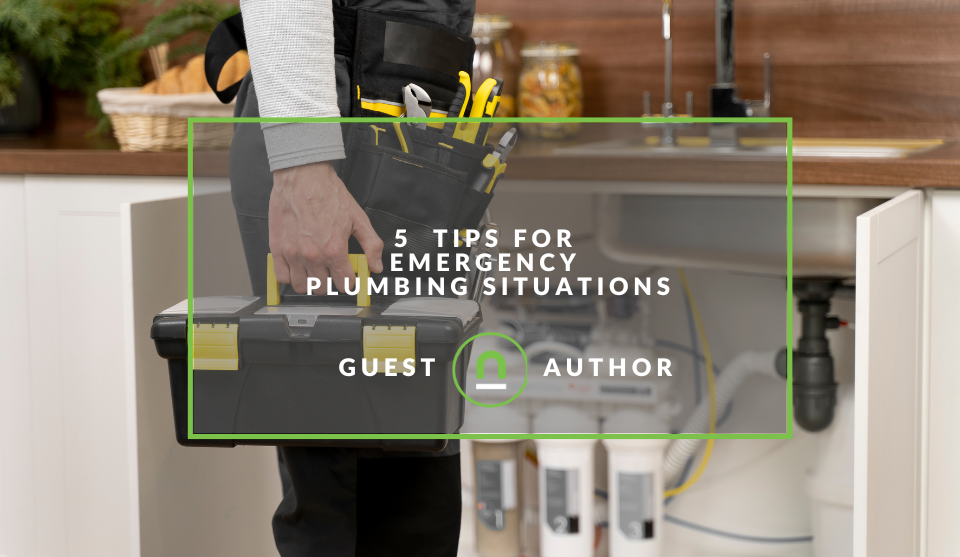Recent posts

nichemarket Advice
The South African VAT Threshold Chokehold
05 December 2025

Doctors Orders
The Difference Between SOAP Notes and DAP Notes
02 December 2025

Petrol heads
Why Load Bin Accessories Make Your Bakkie So Much Easier to Live With
26 November 2025

Alarming
What Is The Part Time Job WhatsApp Scam?
25 November 2025
Popular posts
Extravaganza
Trending Music Hashtags To Get Your Posts Noticed
24 August 2018
Geek Chic
How To Fix iPhone/iPad Only Charging In Certain Positions
05 July 2020
Extravaganza
Trending Wedding Hashtags To Get Your Posts Noticed
18 September 2018
Money Talks
How To Find Coupons & Vouchers Online In South Africa
28 March 2019
5 Tips For Emergency Plumbing Situations
24 November 2023 | 0 comments | Posted by Brigitte Evans in Constructive Criticism
Plumbing emergencies are like uninvited guests—they arrive without warning and can cause chaos if not addressed promptly and effectively. Your home's plumbing system is a maze of pipes and valves, and can be a source of major stress when something breaks down or goes wrong.
Let’s take a look at five essential tips for handling the most common emergency plumbing situations at home that will ensure it stays safe, healthy, and dry.
1. Know your home's plumbing layout
Becoming familiar with your home's plumbing layout is important for responding quickly during emergencies or when you’re planning a major home improvement project. Start by locating the main water shut-off valve, usually found near the water meter or where the main water line enters your home.
Knowing where and how to quickly turn off the water supply can significantly minimize water damage. The same goes for pipes within your walls. This understanding can help in pinpointing potential problem areas and in explaining situations accurately to professionals when needed.
Additionally, make a point of identifying and testing individual shut-off valves for sinks, toilets, and other fixtures. This allows for targeted responses to leaks and overflows, limiting the impact on your home's overall water system.
2. Keep essential tools close at hand
Having the right tools on hand is key for tackling minor plumbing issues before they become major problems. Begin by investing in a reliable plunger—not just for toilets but for sinks and showers as well. A plunger can often dislodge clogs that would otherwise require professional help.
In addition to this, get a set of wrenches (including an adjustable wrench and a pipe wrench) for tightening and loosening connections. Pipe cutters and a hacksaw can also be handy for more advanced DIY fixes.
Don’t forget to include Teflon tape and duct tape for temporary fixes of leaks. These tools are needed to perform quick repairs such as tightening leaky joints or temporarily stopping a small leak in a pipe.
3. Address blocked drains promptly
Blocked drains can easily escalate into plumbing nightmare scenarios. When faced with slow-draining sinks, bathtubs, or showers, tackle the problem as soon as possible. These blockages are not just inconveniences but symptoms of potentially larger issues with your plumbing system.
Begin with a plunger or a hand-cranked drain snake to dislodge common clogs. For kitchen sinks, especially, be mindful of grease and food particles that can accumulate over time, causing significant blockages. If manual efforts fail, you might try a homemade solution of baking soda and vinegar, followed by boiling water.
For recurring blocked drains, it might be a sign of deeper issues such as pipe damage or obstructions in the main sewer line. In such cases, professional intervention is not just recommended; it’s essential.
4. Learn basic repair skills
The ability to perform basic plumbing maintenance and repairs is a valuable skill for any homeowner. Simple tasks like replacing a worn washer in a leaky faucet, fixing a running toilet, or unclogging a minor blockage can save you both time and money. Start by educating yourself on common household plumbing problems.
Online resources, including videos and DIY guides, are plentiful and can provide step-by-step instructions. As the old saying goes, practice makes perfect so start with low-risk repairs to build your confidence. Knowing how to shut off water to individual fixtures, replace components in your toilet cistern, or even apply plumber's tape to prevent leaks can be empowering.
While these skills are useful, it's equally important to recognize the limits of your expertise. Some problems might appear simple but can quickly become complicated, risking further damage if handled incorrectly.
5. Know when to call a professional
The final tip is knowing when a situation is beyond your skill level. While many minor plumbing issues can be handled with DIY fixes, more complex problems require professional expertise. This is particularly true for issues like major leaks, installation of new pipes or fixtures, or anything involving your main water line or sewer line.
A licensed plumber has the tools, experience, and knowledge to diagnose and resolve problems efficiently. They can also provide valuable advice on maintaining your home's plumbing system and preventing future issues.
Attempting to tackle complex plumbing repairs on your own can lead to increased damage and, subsequently, higher repair costs. When in doubt, it’s always safer and more cost-effective to consult a professional in the long run.
Dealing with emergency plumbing situations at home doesn't have to be so stressful. Be prepared and adequately equipped, and you’ll be able to tackle most problems with confidence.
Remember, prompt action and knowing when to seek professional help are crucial in preventing minor issues from escalating into a full-blown crisis. With these tips, you'll not only keep your plumbing in check but also maintain peace of mind.
Tell us your story
Would you like to write for nichemarket just like Mary has? Find out how to submit a guest post, and when you're ready, you can contact us.
Are you looking to promote your business?
Construction businesses can create their free business listing on niche markets. The more information you provide about your business, the easier it will be for your customers to find you online.
Registering with nichemarket is easy; all you will need to do is head over to our sign-up form and follow the instructions. If you require a more detailed guide on how to create your profile or your listing, then we highly recommend you check out the following articles.
Recommended reading
If you enjoyed this post and have time to spare, why not check out these related posts and dive deeper down the rabbit hole that is plumbing.
You might also like
Where Press Releases Live In An Age of AI
21 November 2025
Posted by Che Kohler in nichemarket Advice
How the press release landscape will be affected by the move to AI overviews in search, users moving to LLMs for information and AI summary tools on ...
Read moreThe Difference Between SOAP Notes and DAP Notes
02 December 2025
Posted by Che Kohler in Doctors Orders
A look at SOAP format, which remains the classic choice for healthcare professionals, while DAP notes offer more flexibility for mental health docume...
Read more{{comment.sUserName}}
{{comment.iDayLastEdit}} day ago
{{comment.iDayLastEdit}} days ago
 {{blogcategory.sCategoryName}}
{{blogcategory.sCategoryName}}

